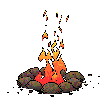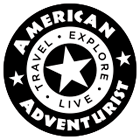The list goes on, doesn't it? Where's the "taking notes" emoji?
Basic wilderness first aid. Fits any mode of travel and any location world wide!
I would agree. And yet, I wonder how many of us have sufficient training/experience to be of use when it counts?
While you don't necessarily need to be an expert at orienteering, you really need to understand the fundamentals of map and compass - true vs magnetic north, magnetic declination, understanding basic map symbols, etc.
Aside from being a very legitimate skill, there's something quietly satisfying about being able to use a map and compass correctly. Definitely on
this adventurist's list of things to try. Suffice to say, I'm still fully in the cached Google maps on a cell phone crowd.

Geezer question...does the compass on a smart phone work if there is no cell service? Guessing that it's GPS based.
Go you, dude. I've tried a number of different ways over the years, but have never been able to make it happen any more ruggedly than flint and steel. I'd love to be confident in knowing I can start a fire with the spinner/friction method. Something to practice this summer for sure.
And yes, because GPS on a smart phone uses satellites, it can still give you a position as far as I know. The problem comes in being overedge on the map without a data signal to download. A nice tip (hinted above) for those who didn't know, if you have an Android, you can add decent sized sections of Google Maps to your "Offline Areas" folder. I've used it to find where the PCT crosses a rally stage in the middle of the night and, more recently, to ensure I could find my way out of the jungle in Kauai. It's pretty convenient if you suspect you're going somewhere the data will be sketch.
Trip planning. Knowing what you need, and what you don't, to meet your goal.
Time
Distance
Logistics
Gear
Weather
Terrain
Hazards
Trip planning is a fine art.
I wholeheartedly agree.
Proper planning prevents piss poor performance. How would you classify knowing what you don't know in this mix? Would you plan an adventure that intentionally put you in a position where you didn't know your next move? Training and prep make a big difference when unexpected and new challenges arrive, but it's not possible to prepare for every contingency...
or is it? Maybe something like
adaptability?
I've had a good amount of training in the military.
That said, it wasn't enough. If you're really passionate about a subject, first aid or navigation or whatever, you never stop studying it or learning.
As a life long learner, I pride myself on being self taught on a variety of subjects. I'm a pretty decent shade tree mechanic purely because it's something I wanted to learn. I don't think that you always need a "course" or "experts" to teach you, if you're passionate on a topic just get your hands dirty and keep at it.
And, one can never read too many books

Preach it. Necessity is the mother of invention. I'm a self-taught mechanic because it was pointed out to me by several forum members that, for the $1000 the dealership wanted to replace my head gasket, I could replace the head gasket myself and have a 0-mile bottom end with forged pistons and rods. I've never taken a single class on publishing, but I've built entire magazines from scratch.
Simply put, you cannot stop someone from learning about something he truly wants to learn.
Travel implies you are going somewhere, so navigation has to be near the top of the list. First Aid to take care of what happens as a result of the other skills you missed.
And math. Remember those word problems from elementary school? You need to be able to work out things like gallons-per-person-per-day, time-distance calcs, fuel consumption, how far can I get before sunset, how much beer will fit in the fridge and still leave room for bacon, how much pierced steel planking do I need to make my truck look "expeditionary", etc ....
The military was great training for all of those, but you have to keep learning. Wilderness First Aid course every 2-3 years, GPS classes etc .... When I learned to navigate it was map, compass, even sextant. But nobody ever showed me how to use a GPS. I use it all the time now, but still feel like I am only using 10% of what it will do.
Oh, and the pan flute. you must be able to play the pan flute.
How different would the world be if we'd been sold the fact that word problems are the most relevant math lessons we've ever been taught? (Instead of allowed to broadly associate them as annoying busy work.) This is a crazy awesome, out-of-the-box suggestion. Kudos!
Lately, I've been thinking about picking up a Ukulele for camp. Get enough of us together, we got ourselves a JAM SESSION.

I seem to remember OVERLAND JOURNAL doing a short piece titled "Seven Knots Every Overlander Should Know How To Tie" some years ago.
I am terrible at knots. It's a good idea for sure.
“A human being should be able to change a diaper, plan an invasion, butcher a hog, conn a ship, design a building, write a sonnet, balance accounts, build a wall, set a bone, comfort the dying, take orders, give orders, cooperate, act alone, solve equations, analyze a new problem, pitch manure, program a computer, cook a tasty meal, fight efficiently, die gallantly. Specialization is for insects.”
― Robert A. Heinlein
Niiiice.
Situational Awareness.
Beyond the obvious personal safety reasons, good situational awareness is also key to making sure you don't miss that one-of-a-kind photo, hidden-gem destination, or super secret opportunity for adventures yet unexplored.
Way to take it meta, Chazz.




 How to start a fire.
How to start a fire.

